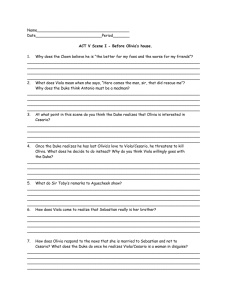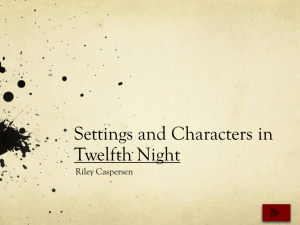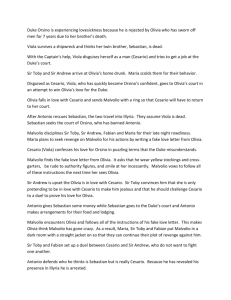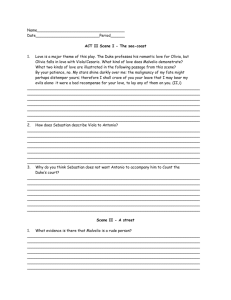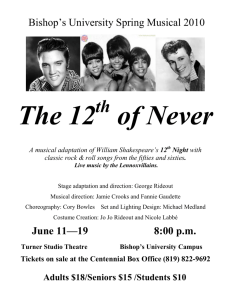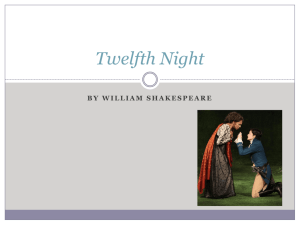Act II, Scene 1
advertisement
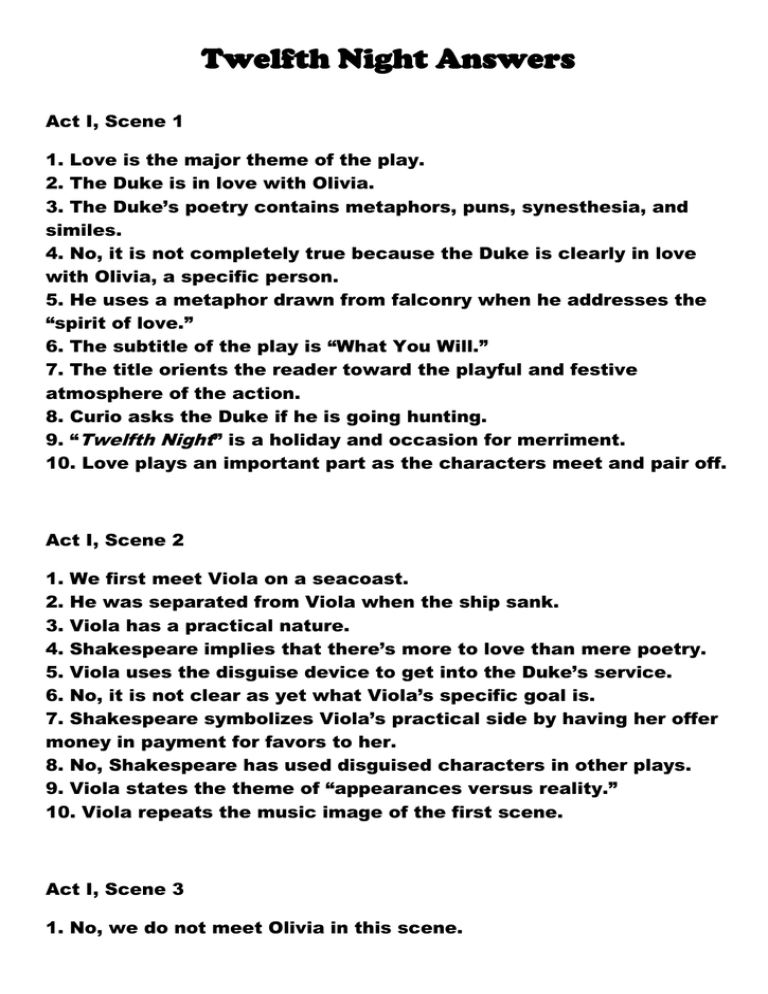
Twelfth Night Answers Act I, Scene 1 1. Love is the major theme of the play. 2. The Duke is in love with Olivia. 3. The Duke’s poetry contains metaphors, puns, synesthesia, and similes. 4. No, it is not completely true because the Duke is clearly in love with Olivia, a specific person. 5. He uses a metaphor drawn from falconry when he addresses the “spirit of love.” 6. The subtitle of the play is “What You Will.” 7. The title orients the reader toward the playful and festive atmosphere of the action. 8. Curio asks the Duke if he is going hunting. 9. “Twelfth Night” is a holiday and occasion for merriment. 10. Love plays an important part as the characters meet and pair off. Act I, Scene 2 1. We first meet Viola on a seacoast. 2. He was separated from Viola when the ship sank. 3. Viola has a practical nature. 4. Shakespeare implies that there’s more to love than mere poetry. 5. Viola uses the disguise device to get into the Duke’s service. 6. No, it is not clear as yet what Viola’s specific goal is. 7. Shakespeare symbolizes Viola’s practical side by having her offer money in payment for favors to her. 8. No, Shakespeare has used disguised characters in other plays. 9. Viola states the theme of “appearances versus reality.” 10. Viola repeats the music image of the first scene. Act I, Scene 3 1. No, we do not meet Olivia in this scene. 2. They are friends. 3. Maria heard that Sir Toby brought him to the house to woo Olivia. 4. They imply that love is for all kinds of people, no matter what their status is. 5. Sir Andrew brings in a note of competition. 6. No, the scene leaves us with the impression that Sir Andrew may not be an appropriate suitor for Olivia. 7. Sir Toby and Sir Andrew illustrate the party-and-fun atmosphere, as implied in the title’s holiday. 8. Shakespeare reveals Sir Toby’s free spirit through the language. 9. “Ploce” is the repetition of a word in a different sense. 10. Sir Toby introduces a succession of “dance” images. Act I, Scene 4 1. Viola’s male name is “Cesario.” 2. The Duke assigns Cesario the task of pursuing Olivia for him. 3. Cesario feels love for the Duke. 4. Twelfth Night belongs to the genre of “comedy.” 5. We expect a happy ending in comedy. 6. Comedy’s vision has a social significance. 7. The community in Illyria is well aware of and talking about the Duke’s love. 8. The Duke tells him to “be clamorous and leap all civil bounds.” 9. The Duke’s impassioned stance toward Olivia changes slightly. 10. Orsino displays common sense at the end of the scene. Act I, Scene 5 1. Maria threatens the Clown with punishment for his absence. 2. The Clown evidences an offhand attitude toward Olivia. 3. The Clown tries to prove that Olivia is a fool. 4. Malvolio is Olivia’s steward. 5. Olivia puts on a veil before speaking with Cesario. 6. Olivia falls in love with Cesario. 7. The love twists suggest just how subjective is the experience of love. 8. The Clown’s speech emphasizes the subjective nature of “love.” 9. The Clown’s insults are couched in a jarringly logical manner. 10. Cesario uses an extended theological metaphor to reflect the Duke’s great love. Act II, Scene 1 1. Antonio is a sea captain. 2. Sebastian is Viola’s brother. 3. Sebastian thinks that Viola has drowned. 4. They find themselves on Illyria’s shore. 5. The purpose of this scene is to inform us about Viola’s twin brother. 6. The style is one of formal, straightforward prose. 7. Sebastian says he is headed for Orsino’s court. 8. Antonio wishes to serve Sebastian. 9. The sources for Twelfth Night are Gl’Ingannati, Bandello, and Riche. 10. The sources have the four essential characters and the plot in common with Shakespeare. Act II, Scene 2 1. Malvolio seeks Cesario to give him a ring. 2. It is a ring from Olivia. 3. Cesario utters a soliloquy. 4. Malvolio emphasizes that Olivia wants Orsino to stop his wooing. 5. Malvolio places the ring on the ground. 6. Cesario feels confused about the ring. 7. Olivia has fallen in love with Cesario. 8. Cesario wonders how the mistaken love will be resolved. 9. Cesario repeats the motif of “appearances versus reality.” 10. Critics have argued over how to interpret Malvolio. Act II, Scene 3 1. For Sir Toby, going to bed after midnight means going to bed early. 2. Sir Andrew calls Feste “the fool.” 3. Sir Andrew compliments the Clown’s singing voice. 4. They offer him money. 5. The Clown suggests either a love song or a song with a moral. 6. The Clown’s song defines “love.” 7. Sir Toby can take on the title of the “lord of misrule.” 8. The comic plot is hatched in this scene. 9. Maria’s motive for the scheme is revenge. 10. Maria plans to drop letters in Malvolio’s way. Act II, Scene 4 1. The Duke requests some music. 2. The Clown is not immediately available to sing the song. 3. Orsino classifies himself as a “true lover.” 4. The Duke surmises that Cesario has been in love. 5. Yes, the age of the male partner does matter. 6. The Clown’s song focuses on the Duke’s frustration with and subsequent failure to obtain Olivia. 7. The Clown insults the Duke. 8. Cesario goes to woo for the Duke. 9. Cesario warns the Duke that Olivia is not open to romance with him. 10. The lover is ready to be buried in a coffin. Act II, Scene 5 1. 2. 3. 4. 5. 6. 7. 8. Fabian is another of Olivia’s servants. Fabian apparently has a bone to pick with Malvolio. Maria has worked out the scheme. The spectators will hide in a box tree. Malvolio fancies himself a suitor to Olivia. Sir Toby and Andrew evidence a sadistic intention. The letter is supposedly in Olivia’s handwriting. “M,O,A,I” lead Malvolio to believe it is addressed to him. 9. They use animal imagery to enlighten us about Malvolio’s situation. 10. Malvolio is alienated from the rest of the household. Act III, Scene 1 1. The Clown is holding a tabor. 2. The Clown says he lives by a church. 3. The Clown is upset with words because they are rascals whose bonds disgraced them. 4. Feste claims to be Olivia’s “corrupter of words.” 5. Cesario praises the Clown’s skill as a fool. 6. Olivia declares her love for Cesario in this scene. 7. Olivia rejects the Duke. 8. Shakespeare establishes a kinship between Cesario and the Clown. 9. They betray their common sense. 10. The characters lack self-knowledge. Act III, Scene 2 1. Sir Andrew is getting ready to leave. 2. Andrew sees Olivia bestow her affection on Cesario. 3. Fabian asserts that she is doing that to exasperate Andrew and to rouse him to some action. 4. Fabian thinks that valor will stir Olivia to passion. 5. Sir Toby comes up with the idea of a fight. 6. Sir Toby assigns a letter to Sir Andrew to be delivered to Cesario. 7. Sir Toby does not plan to deliver the letter. 8. Sir Toby hails Maria in an affectionate manner. 9. Maria describes Malvolio’s absorption in the letter as hilarious. 10. Sir Toby continues to play the role of “lord of misrule” well. Act III, Scene 3 1. Sebastian says he will not chide him. 2. They meet in a street. 3. Antonio’s love and concern for Sebastian encouraged him to keep up. 4. Antonio describes the area as “rough and unhospitable.” 5. Sebastian desires to go sightseeing. 6. Antonio has to decline Sebastian’s offer to accompany him because he is a wanted man. 7. Sebastian reckons Antonio has murdered. 8. Antonio says he is guilty of piracy. 9. Antonio is the missing link in the love strands. 10. Sebastian and Viola have similar thematic functions. Act III, Scene 4 1. Olivia is out of sorts. 2. Olivia commends Malvolio’s nature. 3. The commands of the letter sway Malvolio’s mind as he speaks with Olivia. 4. Malvolio tries to dismiss Sir Toby with “Go off; I discard you.” 5. Sir Toby indicates that he will show mercy on Malvolio when the trick is done. 6. Sir Andrew returns with the letter he wrote. 7. Cesario is not receptive to Olivia’s love. 8. Sir Toby alarms Cesario with the report that Sir Andrew is preparing to attack him. 9. Knowledge of Sebastian’s existence makes this a climactic scene. 10. We can characterize Malvolio’s dialogue with Olivia as comic and perverse. Act IV, Scene 1 1. Sebastian dismisses the Clown. 2. Sebastian tells the Clown to vent his folly elsewhere. 3. Feste tells Sebastian to abandon his pretense, “ungird thy strangeness.” 4. Sebastian, Sir Andrew, and Sir Toby fight in this scene. 5. The Clown goes off to inform Olivia. 6. Olivia breaks up the fight. 7. Olivia calls Sir Toby a “rudesby” and “ungracious wretch.” 8. Olivia issues an invitation to Sebastian. 9. Sebastian is surprised at Olivia’s invitation. 10. Maurice Charney says that Feste has an “agile mind at wordplay.” Act IV, Scene 2 1. Maria gives the Clown a gown and a beard. 2. Maria wants Feste to play Sir Topas. 3. Sir Topas greets Malvolio as “Malvolio the lunatic.” 4. Malvolio is in a very dark room. 5. The two sources of light in the room are bay windows and clerestories. 6. Malvolio perceives himself as a wronged man. 7. Malvolio requests a candle, pen, ink, and paper from Sir Topas. 8. Malvolio asks for a test of his sanity. 9. Sir Toby feels compelled to put a stop to the trick because Olivia disapproves of his nonsense. 10. The darkness image suggests the cruelty of Maria and Sir Toby. Act IV, Scene 3 1. It is appropriate because a wedding is about to take place. 2. Sebastian tries to come to terms with his good luck. 3. The rapidity of the love match prevents us from obtaining Sebastian’s feelings about love. 4. Olivia gives Sebastian a pearl. 5. Sebastian wishes to speak with Antonio. 6. He accepts Olivia’s love. 7. Sebastian praises Olivia’s management of affairs in the house. 8. Olivia has planned a wedding ceremony. 9. She has brought a priest to tie the knot. 10. The key symbolic element is the twins. Act V, Scene 1 1. Feste refuses to show Malvolio’s letter. 2. The Clown refers to Fabian and himself as Olivia’s “trappings.” 3. Antonio thinks Cesario is Sebastian. 4. Olivia calls in the priest to verify her marriage to Sebastian. 5. Sir Andrew has been injured by Sebastian. 6. Sebastian’s presence signals the resolution of the mistaken identity plot. 7. Malvolio casts blame on Olivia. 8. The second couple consists of the Duke and Viola. 9. Sir Toby and Maria make up the third couple. 10. Malvolio desires revenge on all his malefactors.
